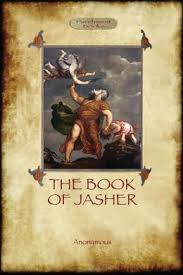Second Samuel begi ns with David learning of the deaths of King Saul and King Saul’s son, Jonathan. As David was lamenting their deaths, David quoted a lengthy poem from the “Book of Jashar” (2 Samuel 1:18–27). This mysterious book is also mentioned in Joshua 10:12–13. What is this “Book of Jashar”? And, should this book be included in the Bible?
ns with David learning of the deaths of King Saul and King Saul’s son, Jonathan. As David was lamenting their deaths, David quoted a lengthy poem from the “Book of Jashar” (2 Samuel 1:18–27). This mysterious book is also mentioned in Joshua 10:12–13. What is this “Book of Jashar”? And, should this book be included in the Bible?
What is the Book of Jashar?
We ought not to think about Jashar as a proper name. The word “Jashar” means “upright one,” so the Book of Jashar is sometimes referred to as the Book of the Upright One.
The Book of Jashar is thought to have been a book of poems and songs about various heroes of the faith. It is ultimately an unknown book, although some claim to have an accurate copy of the book. The book has been used by various cults and sects such as Mormonism and Jehovah’s Witnesses.
Should the Book of Jashar be included in the Bible?
If the Bible quotes the Book of Jashar, why isn’t it in the Bible? Just because a work of antiquity is quoted in the Bible, it does not follow that the work is on par with the Bible. In other words, in order for a book to be included in the canon of scripture, it must have been understood to have been inspired by God. The Book of Jashar simply does not reach that threshold.
There are indeed a number of extra-biblical sources that are quoted in the Bible that are not included in the Bible. One author wrote,
“There are other Hebrew works that are mentioned in the Bible that God directed the authors to use. Some of these include the Book of the Wars of the Lord (Numbers 21:14), the Book of Samuel the Seer, the Book of Nathan the Prophet, and the Book of Gad the Seer (1 Chronicles 29:29). Also, there are the Acts of Rehoboam and the Chronicles of the Kings of Judah (1 Kings 14:29). We also know that Solomon composed more than a thousand songs (1 Kings 4:32), yet only two are preserved in the book of Psalms (72 and 127). Writing under the inspiration of the Holy Spirit in the New Testament, Paul included a quotation from the Cretan poet Epimenides (Titus 1:12) and quoted from the poets Epimenides and Aratus in his speech at Athens (Acts 17:28).”
We can know that everything included in the Bible is inspired by God and therefore truthful and without error, but this inspiration does not necessarily transfer to the remainder of the works quoted.
By way of analogy, we may write a brief essay that is without error and totally truthful. In the process of writing our brief essay, we may even quote from other sources. Even though our essay is without error and totally truthful, it would not necessarily follow that the sources from which we quoted were also completely without error and totally truthful.
In his sovereign wisdom, God guided the thoughts of those who wrote scripture and he protected them from error so that the Bible is completely trustworthy and it is completely without error. God may have inspired these authors to quote from additional sources, but that does not mean that these additional sources are in any way equal to scripture.
2 Peter 1:19–21
19 And we have something more sure, the prophetic word, to which you will do well to pay attention as to a lamp shining in a dark place, until the day dawns and the morning star rises in your hearts,
20 knowing this first of all, that no prophecy of Scripture comes from someone’s own interpretation.
21 For no prophecy was ever produced by the will of man, but men spoke from God as they were carried along by the Holy Spirit.
2 Timothy 3:16–17
16 All Scripture is breathed out by God and profitable for teaching, for reproof, for correction, and for training in righteousness,
17 that the man of God may be competent, equipped for every good work.
For His Glory,
Pastor Brian